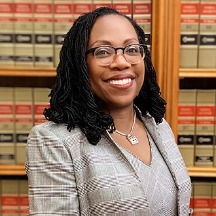On Port Of Harlem Talk Radio, we discussed with author and lawyer Rawn James, Jr. the significance of President Biden’s appointment of Ketanji Brown Jackson to the United States Court of Appeals for the District of Columbia. It’s “the second most important federal court in the United States,” explained the author of “Root and Branch: Charles Hamilton Houston, Thurgood Marshall and the Struggle to End Segregation,” “The Double V: How Wars, Protest and Harry Truman Desegregated America's Military,” and “The Truman Court: Law and the Limits of Loyalty.”
The D.C. Circuit’s prominence among American courts is second only to the U.S. Supreme Court because its jurisdiction contains the U.S. Congress and many U.S. government agencies. Also, three of the current nine justices on the Supreme Court were previously judges on the D.C. Circuit: Chief Justice John Roberts and Associate Justices Clarence Thomas and Brett Kavanaugh.
In May 2020, Joe Biden promised that if elected president, he'd put the first Black woman on the Supreme Court.
It is part of the current political process and citizen’s expectations for a Supreme Court judge to have sat on the United States Court of Appeals for the District of Columbia, says James. He added a “nomination would be hard pressed to get through for someone to come from in-his-hands practice straight through to being on the (Supreme) Court.”
Justice Thomas, he pointed out, barely was unpacked when he was nominated to the Supreme Court. In October 1989, President George H. W. Bush nominated Thomas to the D.C. Circuit, following Robert Bork's departure. After Justice Marshall, the only African-American justice on the Court, announced his retirement, Bush called Thomas the "best qualified at this time,” when nominating him to the Supreme Court to take Marshall’s place on July 1991. Thomas served in the DC Circuit for 16 months.
The Significance of Ketanji Brown Jackson’s Appointment to the US Court of Appeals for DC


Biden’s appointment of Candace Jackson-Akiwumi to the United States Court of Appeals for the Seventh Circuit has equal weight in theory says James. However, we discussed how each of the courts have different weights and historical political leanings.
“They are (equal) in their power to resolve cases,” he explained, but the DC Circuit “tends to have cases that affect a larger segment of the United States population.” The Yale University and Duke University School of Law graduate added “a great deal of the Courts’ power is in its ability to deny hearing cases,” and since the Supreme Court does not accept all cases, the Supreme Court allows many Circuit court rulings to remain as law.
Additionally, James also provided insights into the politics of President Reagan appointing the first Italian-American Supreme Court justice in contrast to Biden’s push to nominate the first African-American woman to the Supreme Court. With two books about President Truman under his belt, he also shared how Truman worked with the NAACP to get his Civil Rights agenda through Congress.
As of the beginning of July, Biden had nominated or announced his intent to nominate 30 jurists to the federal bench. Twenty-three — about 77 percent — of those nominees are women, and 17 — about 57 percent — are women of color, according to an analysis done by Demand Justice. In May 2020, Joe Biden promised that if elected president, he'd put the first Black woman on the Supreme Court. With a better understanding of the mechanics of the courts from James, we can see Biden is on the path to do just that.
Rawn James, Jr on Port Of Harlem Talk Radio
(Actual recording is 30 minutes, not 1:11:54
“They are (equal) in their power to resolve cases,” he explained, but the DC Circuit “tends to have cases that affect a larger segment of the United States population.” The Yale University and Duke University School of Law graduate added “a great deal of the Courts’ power is in its ability to deny hearing cases,” and since the Supreme Court does not accept all cases, the Supreme Court allows many Circuit court rulings to remain as law.
Additionally, James also provided insights into the politics of President Reagan appointing the first Italian-American Supreme Court justice in contrast to Biden’s push to nominate the first African-American woman to the Supreme Court. With two books about President Truman under his belt, he also shared how Truman worked with the NAACP to get his Civil Rights agenda through Congress.
As of the beginning of July, Biden had nominated or announced his intent to nominate 30 jurists to the federal bench. Twenty-three — about 77 percent — of those nominees are women, and 17 — about 57 percent — are women of color, according to an analysis done by Demand Justice. In May 2020, Joe Biden promised that if elected president, he'd put the first Black woman on the Supreme Court. With a better understanding of the mechanics of the courts from James, we can see Biden is on the path to do just that.
Rawn James, Jr on Port Of Harlem Talk Radio
(Actual recording is 30 minutes, not 1:11:54
Advertisers | Contact Us | Events | Links | Media Kit | Our Company | Payments Pier
Press Room | Print Cover Stories Archives | Electronic Issues and Talk Radio Archives | Writer's Guidelines






